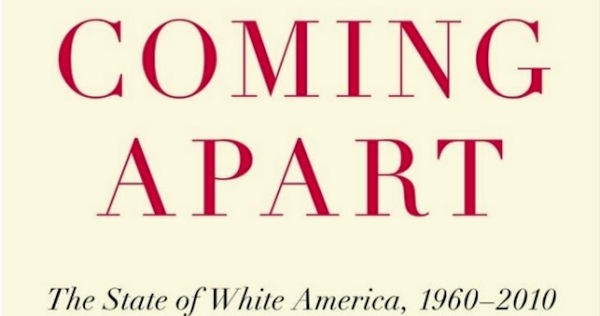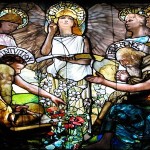One of the things we try to do with Fare Forward is find, learn from, and connect people who are doing interesting things with their lives, and who are applying the kind of rigorous thought we explore in our pages to projects and vocations. We hope to progressively feature more conversations with such people on the blog, as well as updates on Fare Forward’s own activities and projects.
Anne Snyder is a research and editorial assistant at the New York Times, where she works closely with David Brooks. She was a key speaker at the first annual Fare Forward symposium (she’s also agreed to join our board of directors), and during her talk she mentioned she was interested in pursuing “Dorothy Day-style” journalism when she leaves the Times at some point in the future. I met with her to follow-up on that idea, and explore her formative influences more deeply.
One of the things Anne and I talked about was Coming Apart, Charles Murray’s masterful exploration of the growing economic and cultural divisions between elite and working class whites. The central thesis of Coming Apart—reviewed here by Andrew Schuman in FF—is that the upper class is profiting from practicing virtues of industriousness and self-restraint, but the lower class has lost those virtues and is suffering as a result. Murray’s solution is for elites to “preach what they practice” and try to persuade the lower class—from whom they have become increasingly isolated—to adopt these virtues as well.
At FF, we’ve been primarily interested in thinking through how the church can help bridge the gap Murray describes without falling into unproductive moralism or “savior complexes.” Ross Douthat—our keynote speaker at the symposium—has written about this, and we’ve covered a Detroit church living that mission out in our pages. Given how important this book has been for us, I was excited that she mentioned it, and we talked about how it had influenced her.
Though she disagreed with some of its content*, she found the book helpful in thinking through her vocation. After she leaves the Times she wants to work on cross-class integration by doing embedded journalism in immigrant communities. Suburban immigrant communities are apparently one of the few places left in American where different classes live in the same neighborhood, where there’s a mixture between people gunning for Harvard and others struggling to finish high school.
Though her plans are really provisional at this point, she hopes to maybe work as a guidance counselor in one of these communities and write about it with a Charles Murray-ite lens. A lot of journalism today, she noted, focuses on objectivity, but she doesn’t fully identify with that value. There’s something about being embedded, about writing and storytelling out of keenly felt experience, that can communicate a deeper truth.
A huge influence for her in this vision is Dorothy Day, the 20th century Catholic activist and journalist. I had just finished reading Day’s biography of Peter Maurin, who helped co-found The Catholic Worker magazine with Day, so we talked about them for a while. Anne was lucky enough to take a trip to Marquette, which houses both Day’s and JRR Tolkien’s archives, and see both Day’s prison smock and tons of “stunning” Tolkien drawings. According to Anne, herself a Protestant, not enough Protestants know and study Day, who really could be a model for Christians today.
I’d add that this is probably amply true for Catholics as well. Some people are put off by her pacifism and her hostility to capitalism. This is probably all the more reason to read her, for her ability to challenge us even if we don’t agree with her. But even if we put those items of controversy aside, there’s still a lot we can learn from her.
One of the things Anne found attractive in Day’s life, for example, is the way she integrated writing and service, intellect and heart, in her vocation. Prior to working at The Times, Anne worked at a think tank during the day and a rehab clinic in the morning, but these two parts of her life didn’t feel connected. In the kind of embedded journalism she’s looking to pursue, she’ll be able to bring these together.
For those in the DC area, Anne will be speaking on some of these themes in a short talk at a FF gathering in September. If you’re interested, email us at fareforewardjournal at gmail dot com. There’s a limited number of spaces, so it’s first come, first serve.
* As she told me, she thinks it’s wrong to assume that the upper class has all the virtues, just because they have lower divorce rates and are succeeding on other indicators as well.
















